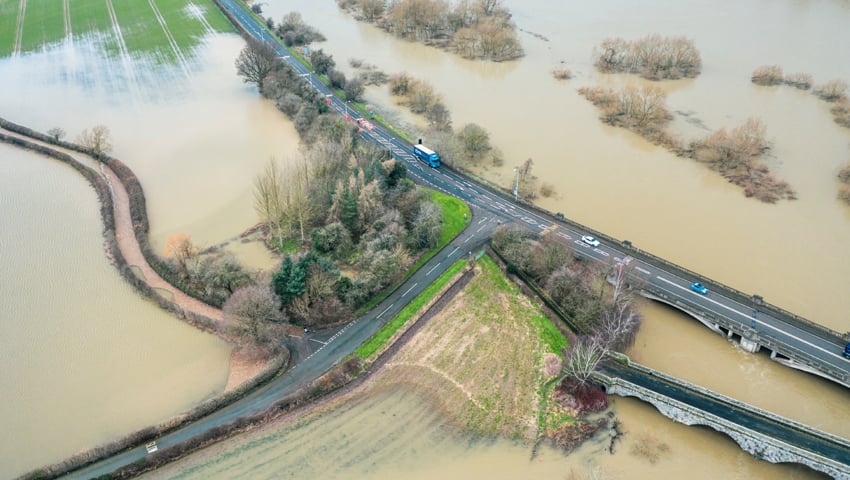Recent UK flooding has once again highlighted the urgent need for a climate adaptation plan that includes the regeneration of agricultural land, and in particular the restoration of Britain’s soil carbon sponge.
At Groundswell in 2024, Pelican Ag ran a session called Restoring Water Cycles, which featured world-renowned hydrologist, Walter Jehne. In his introduction, Pelican Ag Founding Partner, Christopher Ramsay, described Jehne as ‘the David Attenborough for hydrology’.
Through a pre-recorded video address, Jehne said, ‘While regenerative people have been working for the last decade in this area quite actively, we’re now hitting a point where what you’re doing is critical to humanity globally because climate extremes are happening now – well before predicted by the models. And these climate stresses, be they storms, floods, droughts, desiccation or wildfires are actually collapsing the very biosystems we need for our survival.
“We’re now in a situation where, unless we fix this problem in the next 10 years, humanity could be really facing crisis of food habitat stability because of these climate extremes – and the only way we can fix them is as nature does.
“The only way we can fix them is through hydrology – through the rebuilding the buffering and resilience of biosystems that the natural hydrology provides.
“And it’s basically hydrology that provides 95 per cent of the heat dynamics of the Blue Planet – it’s hydrology that’s enabled life to evolve – it’s the hydrology that enabled life on land to expand from 420 million years ago across the whole land surface – and it’s hydrology that regulates the productivity and resilience of our habitats.
“And hydrology does that or is enabled to do that because of ground swell – because of the formation of the Earth’s soil carbon sponge, that process of photosynthesis and microbial bio-sequestration whereby solar energy and CO2 are fixed and converted into, initially biomass and then stable soil carbon through pedogenesis to create the sponge, to create those well-structured soils that can infiltrate retain and make available water and sustain the longevity of green growth.
“We now need to use those same regenerative pedogenesis soil-forming processes to rebuild the hydrology and thereby the resilience of this landscape.”
Jehne explained that the soil carbon sponge is essential for climate mitigation and adaptation, and that functioning soil, supporting good ground cover, can actually keep the Earth cooler and reduce heat feedback.
He concluded that the regeneration of Earth’s soils is possible, but that humanity only has around ten years to deliver soil regeneration if it is to make any difference to the climate impacts already locked in.
Following Walter Jenhe’s lecture, Pelican Ag Founding Partner, Simon Evill, highlighted key takeaways from the talk and presented UK case studies demonstrating the practical achievability of Jehne’s propositions.
He said, “Whether you think that agriculture started you know 10,000 years ago or 20,000 years ago it’s still an emerging field. The problems didn’t only start with chemical agriculture in the industrial revolution. Our ancestors have been unwittingly engaging in a process of ecological destruction; we’ve just simply been speeding up the process.
“But, as Walter was touching on with the soil carbon sponge, this relationship between carbon and water is actually critical. Carbon is extremely hydrophilic in soil – one particle of carbon holds roughly four parts of water, so there’s an exponential relationship between the availability of water in the landscape in its relationship with carbon.”
Watch the full session, Restoring Water Cycles with Walter Jehne & Pelican Ag
Read Walter Jehne’s article about the soil carbon sponge and ecological security
